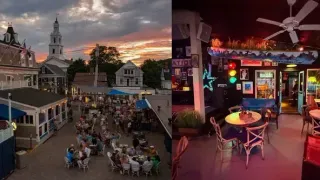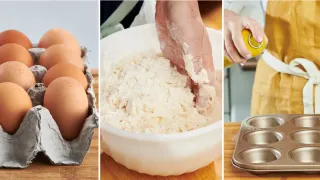November 13, 2016
What is the 'I' in LGBTQI?
Joney Harper READ TIME: 5 MIN.
In our community's alphabet soup, I often hear, "What does the 'I' stand for?" I often hear answers like: "inter-gendered;" "inquisitive;" "inter-gay," but sometimes "intersex."
So, what exactly is intersex? Well, it is more than a nicer term for Hermaphrodite. By definition, it explains a person born with sexual characteristics that are not typical of male or female. This does not mean they are born with complete sets of male and female sex organs.
There are as many variations of intersex conditions as there are intersex people. I would explain all of them, but that would require me writing a book. I will talk about some of the most common.
Before I go on, lets discuss chromosomes. Males are "XX" and females are "XY." Usually, most males and females have 46 chromosomes or 23 matched pairs.
Jamie Lee Curtis has been rumored as being intersex, even though, to-date, there is no evidence of this. She supposedly has Androgen Insensitivity Syndrome or AIS. This a person who is unable to absorb male hormones. So, even though this person would have male chromosomes, they would grow up looking female. Therefore, in the case of AIS, they would have "XX" chromosomes.
There are also some other common variations, like Kliefelter Syndrome and Androgen Insensitivity Syndrome.
Those with Klinefelter Syndrome present with "XXY." Men with this condition have small testes, sometimes develop breasts and have little-to-no body hair. In the case of "XXY," they would have 47.
Partial Androgen Insensitivity Syndrome may cause the clitoris in a female to be larger or in a male, the penis and testes could be smaller.
But, how common is it for intersex conditions to occur? Based on the information from the Intersex Society of North America, they can occur in as low as 1 in every 100 births. You can do further research into intersex conditions at isna.org.
On a side note, intersex is now being referred to as Disorders in Sexual Development. I am torn by this, since it, again, makes people with intersex conditions seem abnormal, when intersex conditions are naturally occurring - It's sort of like making homosexuality a mental disorder again, especially since most intersex individuals are regular people like everyone else.
Back in the day (like when I was born), doctors would surgically alter children to look more male or female, often without consulting the parents or not considering the parents' wishes. Sometimes it took more than one surgery - all this to make them fit into a binary mold. Today, the American Medical Association suggests that doctors and parents let the child develop naturally and decide for themselves whether or not to have surgery.
Here's a little about myself. I was born in the mid-1960s. I am actually a twin who absorbed the other. I have two sets of chromosomes, XY46/XX46 - two sets 46 chromosomes each. How could this be? Believe me, I asked the same question when I was told. This is the story short of a much longer one which I can share at a later date.
Oddly, we are all conceived as the same gender. During a "hormone bath," the process triggers what gender we will be. In my case, one twin got male chromosomes and the other got female, then the absorption happened, forming me. I am not a doctor, so that is the best I can explain from what I had been told.
I evidently had ambiguous genitalia. This meant, when I was born, doctors performed surgery to make me look, genital wise, more male. I evidently had a partial vaginal opening and a recessed teste. The other one was missing. They took what I think was the labia to make a scrotum, inserting polymer teste for the missing one. This means I have a perfect scrotum, because it was man-made. They released my penis, which may have been more of a large clitoris to make it more natural. My doctors are making assumptions as to what transpired, because finding records from the mid-1960s is like getting a presidential candidate's tax returns. I digress.
I was never told this had occurred. My parents did not help. Growing up, my father was hardly there, but my mother raised me more like a girl than a boy. When I was young, I just thought I was a girl. My mother taught me stereotypical stuff girls learned during the 1960s. I learned how to help her in the house. I learned how to sew, iron and brush my long hair before going to bed. She even taught me how to do my nails. During birthdays and Christmas, I would get generic toys, but Barbies from my mother on the side. I would play with other girls, because boys were "icky."
My world changed when I was seven. My mother passed away. My father took all the girl things away. Suddenly, I was in a boy's world. I tried to adjust, but this took years. In my pre-teens, I got monthly shots, being told I was getting vitamins to help me grow, even though none of my four siblings got the same shots. Later I found out this was testosterone to help me look more like a boy my age. It didn't help much though! I looked like a young teenage girl until I was a senior in high school.
At the age of 12 it got more confusing. I had some "bumps" in my areolas. My father thought it was cancer. After being examined for a half hour by a doctor, my father and the doctor went to another office. Later I was told that it was where little boys store their sperm. It wasn't till I had Biology 101 in high school that I learned that was impossible. My father was in denial until he finally told me the truth a month before he passed away.
I found out by doctors the hard way. I have always known I was physically different, but never knew what was going on until I thought I was having a heart attack. I found out I was not, but found out I was suffering from a hormonal imbalance. After several tests, I found out I had an intersex condition. I tried to talk them out of the diagnosis, because of what I thought I knew. I'd fathered a daughter, so this couldn't be right? They told me that was a myth, that all intersex people were sterile. I have since accepted the situation.
Before I go, I want to mention North Carolina's HB2 law. This law was obviously directed, not only toward the broader LGBT community, but heavily on the transgender one. This law impacts all gender variant people, whether they know it or not. For example, my grandparents almost look alike since they are in their 90s. So, would the bathroom police stop them and ask for a birth certificate? I personally have never been stopped from using the women's room. My birth certificate did not have a gender on it until my father decided to change it when I was 13. Why would I want to carry my birth certificate around anyway?
Enough for now. I hope I gave you some insight into the intersex world.
 Copyright QNotes. For more articles from QNotes visit
Copyright QNotes. For more articles from QNotes visit 





